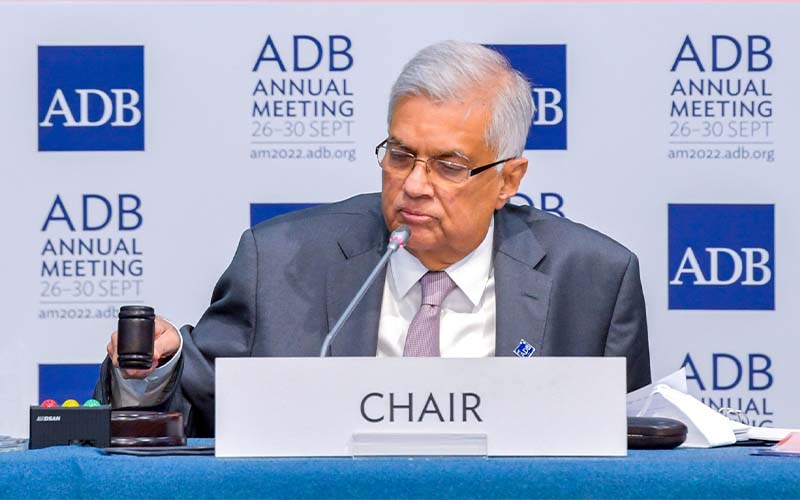
President Wickremesinghe said factors underlining the main crisis is not only economic but are also consequences of evolving geopolitics
Addressing the 55th Annual Meeting of the ADB Board of Governors in the Philippines, President Ranil Wickremesinghe said amidst major economic stress, Sri Lanka is undertaking an unprecedented fiscal effort as part of the government’s commitment to restoring the country’s debt sustainability. Therefore, he expressed hope and expectation that Sri Lanka’s creditors, and all stakeholders, will support Sri Lanka in these efforts to restore the country’s debt sustainability and help put the country back on the path of inclusive and sustainable economic growth.
President Wickremesinghe presided over the annual meeting of the ADB Board of Governors this morning (29) which was held at the ADB headquarters in Manila, Philippines and attended by Governors and official government delegations.
President Wickremesinghe noted that the government has already undertaken major macroeconomic policy reform measures and this program is aligned with the commitment of the government to implement an ambitious and comprehensive package of reforms that will help restore the sustainability of the country’s public finances, addressing external imbalances, and restarting the growth engine through structural reforms and improvements in governance.
“Amidst major economic stress, Sri Lanka is undertaking an unprecedented fiscal effort as part of our commitment to restoring the country’s debt sustainability. It is our hope and expectation that Sri Lanka’s creditors, and all stakeholders, will support us in these efforts to restore our debt sustainability and help put the country back on the path of inclusive and sustainable economic growth,” he said.
The President said that whilst Sri Lanka undertakes these deep and often painful reforms, the country is experiencing rising unemployment and a reduction in purchasing power of the consumers. He added that the government is cognisant of the adverse impacts on the most vulnerable members of society, adding that every effort has been taken to allocate greater financing and resources towards targeted support for social protection.
He assured that the government has stabilized Sri Lanka’s economy and many countries and stakeholders are keenly monitoring how they resolve this crisis. Wickremesinghe said that his government is well aware that the evolution of Sri Lanka’s economic crisis includes both domestic policy elements as well as external shocks, adding that the resolution of the crisis also requires both domestic efforts and the support of external partners. “It is incumbent upon Sri Lanka and our creditors and partners to set an example of how collaborative and good faith action can result in sustainable and equitable solutions to sovereign debt issues.”
However, he emphasized that the economic levers alone are insufficient to stimulate global economic recovery. Adding that the factors underlining the main crisis is not only of economic origin, the President said they are also the consequences of evolving geopolitics.
He noted that as this global rivalry intensifies into a new cold war, which will determine a new global power balance by 2050, the inability of the major countries to give leadership to the mitigation of the global climate change crisis is becoming more apparent.
“As they say in many of our countries when the elephants fight, it is the grass that is crushed. This is the predicament of many of our member countries. Therefore, we must overcome the geopolitical rivalries to address the major threats to our existence, otherwise we will all fail leading to instability in our region reminiscent of Europe after World War I. On the other hand, our ability to successfully meet these challenges will lead to remarkable progress in raising the living standards of our people through the rise of the economies of our member countries.”
Hence, President Wickremesinghe said that the ADB’s Strategy 2030 seeks to respond to global challenges, including climate change and natural disasters, food and energy insecurity, whilst also embracing opportunities in the digital economy, sustainable energy, and leveraging technology for inclusive education and healthcare. Thus, he said that the ADB has a crucial role in helping to shape and finance policies that improve people’s lives and livelihoods across Asia and the Pacific. (PMDNEWS)